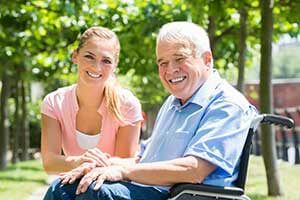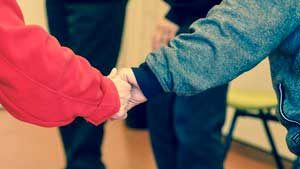 When loved ones reach an age where they are considered elderly, there are many potential difficulties that can arise. Family members and loved ones want to ensure the best quality of life possible for their elderly relative. More often than not, the elderly person in question wants to stay in their own home instead of opting for facility-based care.
When loved ones reach an age where they are considered elderly, there are many potential difficulties that can arise. Family members and loved ones want to ensure the best quality of life possible for their elderly relative. More often than not, the elderly person in question wants to stay in their own home instead of opting for facility-based care.
If this is the case for your own elderly relative, it’s important to consider the level of in-home care they may require. In-home care service providers offer extensive support in the home. The services they provide include everything from grooming and hygiene to conversation and companionship. Before deciding if in-home care is required, and to what extent, it is best to consider three of the most common difficulties for the elderly around the home:
Health Issues
Chronic illness or health-related disabilities become increasingly common as we all age. The most common health concerns for seniors include arthritis, osteoporosis, diabetes, respiratory diseases, and Alzheimer’s. All of these conditions require different levels and types of care. An elderly person who suffers with diabetes, for example, may be mostly independent but will still likely need some help with dietary guidelines, particularly because poor diet choices is a common occurrence in the elderly. An osteoporosis sufferer will likewise experience different problems: their diet may be fine, but they will likely need someone to check on them on a daily basis—osteoporosis results in brittle bones, meaning that if an elderly person falls, it can be very serious.
Their physical health issues can often mean that an elderly person struggles to take good care of themselves regardless of how good their intentions are. This is a common reason why outside help is sought. Quite often, the family and friends of the elderly person in question can’t commit to around-the-clock care because they have their own jobs and responsibilities to take care of. If your elderly relative insists on staying in their own home, everyone involved in the decision making progress should get together and have a long discussion about the potential consequences of this.
It is often thought that in-home care is always cheaper than residential care, but in reality the cost of in-home care depends on the level of care required. If your elderly relative is pretty independent and only needs help with a bit of light housework, you’ll find that the cost is relatively low. If, however, your relative needs a lot of care and can’t do most basic tasks by themselves, the costs could soon add up. In-home care service providers will work with you in order to devise the best care plan for your relative.
Financial Issues
By the time someone is deemed elderly, the house they own is usually paid off. Thus, even though in-home care can be expensive, at least you know that there is no danger of falling behind on mortgage payments.
This does not mean, however, that the elderly do not have financial issues. Elderly people generally have a small fixed income. Pensions, retirement plans, and social security are often their only source of reliable monthly income. Unlike a younger person, who can often pick up extra money when they have once-off expenses, elderly people are often too sickly to work. Thus, unexpected costs can really knock them off guard. For example, if they’re living in their own home and their boiler needs replaced, or their roof needs to be fixed, it can prove quite stressful trying to deduct lump sums out of a fixed monthly income.
Isolation
Depending on where they live, and how involved they are in the community, an elderly person who chooses to remain in their own home can become subjected to feelings of isolation. The extent of their health problems can often affect the level of potential isolation they experience: for example, if they are in good health and can still drive, they will be more likely to participate in social events.
However, in general, loneliness is quite common among the elderly. Millions of elderly people live completely alone, often because their husband or wife is no longer with them. Family members and loved ones should get together and create a visitation schedule that is convenient for all involved, in order to ensure that their relative gets as much social contact as possible.
Caring for Your Loved One
 Health issues, financial issues, and isolations are three of the most common difficulties an elderly person faces; particularly when they choose to remain in their own homes. Residential care homes may be beneficial for increased social contact, but are also very expensive. Independent living communities suit some elderly people, but many want to stay in familiar surroundings. As a result, family members who support their relative are often relied upon in order to ensure the highest quality of life possible for the elderly person in question.
Health issues, financial issues, and isolations are three of the most common difficulties an elderly person faces; particularly when they choose to remain in their own homes. Residential care homes may be beneficial for increased social contact, but are also very expensive. Independent living communities suit some elderly people, but many want to stay in familiar surroundings. As a result, family members who support their relative are often relied upon in order to ensure the highest quality of life possible for the elderly person in question.